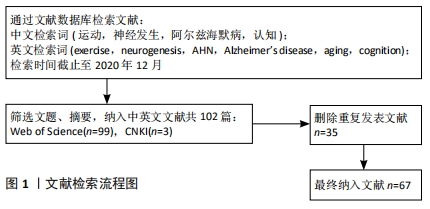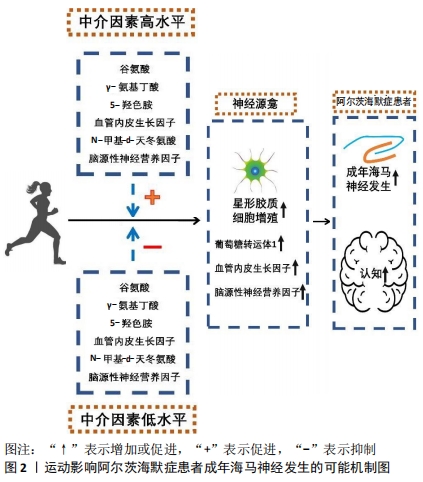[1] VAN PRAAG H, KEMPERMANN G, GAGE F. Running increases cell proliferation and neurogenesis in the adult mouse dentate gyrus. Nat Neurosci. 1999;2(3):266-270.
[2] VOSS M, HEO S, PRAKASH R, et al. The influence of aerobic fitness on cerebral white matter integrity and cognitive function in older adults: results of a one-year exercise intervention. Hum Brain Mapp. 2013;34(11):2972-2985.
[3] LAUTENSCHLAGER N, COX K, ELLIS K. Physical activity for cognitive health: what advice can we give to older adults with subjective cognitive decline and mild cognitive impairment? Dialogues Clin Neurosci. 2019;21(1):61-68.
[4] PIERRET C, MORRISON J, RATH P, et al. Developmental cues and persistent neurogenic potential within an in vitro neural niche. BMC Dev Biol. 2010;10:5.
[5] ANACKER C, LUNA VM, STEVENS GS, et al. Hippocampal neurogenesis confers stress resilience by inhibiting the ventral dentate gyrus. Nature. 2018;559(7712):98-102.
[6] BOLDRINI M, FULMORE CA, TARTT AN, et al.Human Hippocampal Neurogenesis Persists throughout Aging. Cell Stem Cell. 2018;22(4): 589-599. e585.
[7] JESSBERGER S, CLARK RE, BROADBENT NJ, et al. Dentate gyrus-specific knockdown of adult neurogenesis impairs spatial and object recognition memory in adult rats. Learn Mem. 2009;16(2):147-154.
[8] BREHMER Y, KALPOUZOS G, WENGER E, et al. Plasticity of brain and cognition in older adults. Psychol Res. 2014;78(6):790-802.
[9] MING GL, SONG H. Adult Neurogenesis in the Mammalian Brain: Significant Answers and Significant Questions. Neuron. 2011;70(4):687-702.
[10] VIVAR C, PETERSON BD, VAN PRAAG H. Running rewires the neuronal network of adult-born dentate granule cells. Neuroimage. 2016;131: 29-41.
[11] GAUGLER J, JAMES B, JOHNSON T, et al. 2019 Alzheimer’s disease facts and figures. Alzheimers Dement. 2019;15(3):321-387.
[12] BATEMAN RJ, XIONG C, BENZINGER TLS, et al. Clinical and Biomarker Changes in Dominantly Inherited Alzheimer’s Disease. New Eng J Med. 2012;367(9):795-804.
[13] JACK CR JR, BENNETT DA, BLENNOW K, et al.NIA-AA Research Framework: Toward a biological definition of Alzheimer’s disease.Alzheimers Dement. 2018;14(4):535-562.
[14] VERMUNT L, SIKKES SAM, VAN DEN HOUT A, et al.Duration of preclinical, prodromal, and dementia stages of Alzheimer’s disease in relation to age, sex, and APOE genotype. Alzheimers Dement. 2019;15(7):888-898.
[15] SASAGURI H, NILSSON P, HASHIMOTO S, et al. APP mouse models for Alzheimer’s disease preclinical studies. EMBO J. 2017;36(17):2473-2487.
[16] MORENO-JIMÉNEZ E, FLOR-GARCÍA M, TERREROS-RONCAL J, et al. Adult hippocampal neurogenesis is abundant in neurologically healthy subjects and drops sharply in patients with Alzheimer’s disease. Nat Med. 2019;25(4):554-560.
[17] JIN K, PEEL AL, MAO XO, et al.Increased hippocampal neurogenesis in Alzheimer’s disease. Proc Natl Acad U S A. 2004;101(1):343-347.
[18] IHUNWO A, TEMBO L, DZAMALALA C. The dynamics of adult neurogenesis in human hippocampus. Neural Regen Res. 2016;11(12):1869-1883.
[19] RODRÍGUEZ J, JONES V, TABUCHI M, et al.Impaired adult neurogenesis in the dentate gyrus of a triple transgenic mouse model of Alzheimer’s disease. Plos One. 2008;3(8):e2935.
[20] MIROCHNIC S, WOLF S, STAUFENBIEL M, et al.Age effects on the regulation of adult hippocampal neurogenesis by physical activity and environmental enrichment in the APP23 mouse model of Alzheimer disease.Hippocampus. 2009;19(10):1008-1018.
[21] NIEDERER I, KRIEMLER S, GUT J, et al. Relationship of aerobic fitness and motor skills with memory and attention in preschoolers (Ballabeina): a cross-sectional and longitudinal study. BMC Pediatr. 2011;11:34.
[22] TAKEHARA K, GANCHIMEG T, KIKUCHI A, et al. The effectiveness of exercise intervention for academic achievement, cognitive function, and physical health among children in Mongolia: a cluster RCT study protocol. Bmc Public Health. 2019;19(1):697.
[23] DONNELLY J, HILLMAN C, CASTELLI D, et al.Physical Activity, Fitness, Cognitive Function, and Academic Achievement in Children: A Systematic Review. Med Sci Sports Exerc. 2016;48(6):1197-1222.
[24] SMITH P, BLUMENTHAL J, HOFFMAN B, et al. Aerobic exercise and neurocognitive performance: a meta-analytic review of randomized controlled trials. Psychosom Med. 2010;72(3):239-252.
[25] FALCK R, DAVIS J, BEST J, et al. Impact of exercise training on physical and cognitive function among older adults: a systematic review and meta-analysis. Neurobiol Aging. 2019;79:119-130.
[26] SANDERS L, HORTOBÁGYI T, LA BASTIDE-VAN GS, et al.Dose-response relationship between exercise and cognitive function in older adults with and without cognitive impairment: A systematic review and meta-analysis. Plos One. 2019;14(1):e0210036.
[27] YAU S, GIL-MOHAPEL J, CHRISTIE B, et al. Physical exercise-induced adult neurogenesis: a good strategy to prevent cognitive decline in neurodegenerative diseases? Biomed Res Int. 2014;2014:403120.
[28] INOUE K, OKAMOTO M, SHIBATO J, et al. Correction: Long-Term Mild, rather than Intense, Exercise Enhances Adult Hippocampal Neurogenesis and Greatly Changes the Transcriptomic Profile of the Hippocampus.Plos One. 2015;10(7):e0133089.
[29] 张象,张业廷.运动改善阿尔茨海默症模型小鼠病程的剂量效应关系[J].中国组织工程研究,2021,25(17):2761-2766.
[30] ZHAO C, TENG E, SUMMERS R, et al. Distinct morphological stages of dentate granule neuron maturation in the adult mouse hippocampus.J Neurosci. 2006;26(1):3-11.
[31] MILLER R, MARRIOTT D, TROTTER J, et al. Running exercise mitigates the negative consequences of chronic stress on dorsal hippocampal long-term potentiation in male mice. Neurobiol Learn Mem. 2018; 149:28-38.
[32] JI J, JI S, SUN R, et al. Forced running exercise attenuates hippocampal neurogenesis impairment and the neurocognitive deficits induced by whole-brain irradiation via the BDNF-mediated pathway. Biochem Biophys Res Commun. 2014;443(2):646-651.
[33] RAMIREZ-AMAYA V, ANGULO-PERKINS A, CHAWLA M, et al. Sustained transcription of the immediate early gene Arc in the dentate gyrus after spatial exploration. J Neurosci. 2013;33(4):1631-1639.
[34] SAXE MD, BATTAGLIA F, WANG JW, et al.Ablation of hippocampal neurogenesis impairs contextual fear conditioning and synaptic plasticity in the dentate gyrus. Proc Natl Acad Sci U S A. 2006;103(46):17501-17506.
[35] SNYDER J, RADIK R, WOJTOWICZ J, et al.Anatomical gradients of adult neurogenesis and activity: young neurons in the ventral dentate gyrus are activated by water maze training. Hippocampus. 2009;19(4):360-370.
[36] TRIPATHI S, VERMA A, JHA S. Training on an Appetitive Trace-Conditioning Task Increases Adult Hippocampal Neurogenesis and the Expression of Arc, Erk and CREB Proteins in the Dorsal Hippocampus. Front Cell Neurosci. 2020;14:89.
[37] DUPRET D, REVEST J, KOEHL M, et al.Spatial relational memory requires hippocampal adult neurogenesis. Plos One. 2008;3(4):e1959.
[38] PARK E, BURGHARDT N, DVORAK D, et al.Experience-Dependent Regulation of Dentate Gyrus Excitability by Adult-Born Granule Cells.J Neurosci. 2015;35(33):11656-11666.
[39] SHIHABUDDIN L, HORNER P, RAY J, et al.Adult spinal cord stem cells generate neurons after transplantation in the adult dentate gyrus.J Neurosci. 2000;20(23):8727-8735.
[40] ZHAO C, DENG W, GAGE F. Mechanisms and functional implications of adult neurogenesis. Cell. 2008;132(4):645-660.
[41] RIQUELME P, DRAPEAU E, DOETSCH F. Brain micro-ecologies: neural stem cell niches in the adult mammalian brain.Philosophical transactions of the Royal Society of London. Philos Trans R Soc Lond B Biol Sci. 2008;363(1489):123-137.
[42] 赵祥,魏翠兰,张业廷.神经发生和炎性环境在运动条件下的改变与调节[J].中国组织工程研究,2021,25(5):813-820.
[43] PANATIER A, ARIZONO M, NÄGERL U. Dissecting tripartite synapses with STED microscopy.Philosophical transactions of the Royal Society of London. Philos Trans R Soc Lond B Biol Sci. 2014;369(1654):20130597.
[44] FREEMAN M. Specification and morphogenesis of astrocytes. Science (New York, N.Y.). 2010;330(6005):774-778.
[45] SONG H, STEVENS C, GAGE F. Neural stem cells from adult hippocampus develop essential properties of functional CNS neurons. Nat Neurosci. 2002;5(5):438-445.
[46] SAUR L, BAPTISTA P, DE SENNA P, et al.Physical exercise increases GFAP expression and induces morphological changes in hippocampal astrocytes. Brain Struct Funct. 2014;219(1):293-302.
[47] ALLEN A, MESSIER C. Plastic changes in the astrocyte GLUT1 glucose transporter and beta-tubulin microtubule protein following voluntary exercise in mice. Behav Brain Res. 2013;240:95-102.
[48] MERLINI M, WANNER D, NITSCH R. Tau pathology-dependent remodelling of cerebral arteries precedes Alzheimer’s disease-related microvascular cerebral amyloid angiopathy. Acta Neuropathol. 2016;131(5):737-752.
[49] POMBERO A, GARCIA-LOPEZ R, ESTIRADO A, et al. Vascular pattern of the dentate gyrus is regulated by neural progenitors. Brain Struct Funct. 2018;223(4):1971-1987.
[50] KATSIMPARDI L, LITTERMAN N, SCHEIN P, et al.Vascular and neurogenic rejuvenation of the aging mouse brain by young systemic factors.Science (New York, N.Y.). 2014;344(6184):630-634.
[51] CAO L, JIAO X, ZUZGA D, et al.VEGF links hippocampal activity with neurogenesis, learning and memory. Nat Genet. 2004;36(8):827-835.
[52] FABEL K, FABEL K, TAM B, et al.VEGF is necessary for exercise-induced adult hippocampal neurogenesis.Eur J Neurosci. 2003;18(10):2803-2812.
[53] BERGAMI M, MASSERDOTTI G, TEMPRANA S, et al. A critical period for experience-dependent remodeling of adult-born neuron connectivity. Neuron. 2015;85(4):710-717.
[54] GE S, GOH E, SAILOR K, et al. GABA regulates synaptic integration of newly generated neurons in the adult brain. Nature. 2006;439(7076): 589-593.
[55] JAGASIA R, STEIB K, ENGLBERGER E, et al.GABA-cAMP response element-binding protein signaling regulates maturation and survival of newly generated neurons in the adult hippocampus. J Neurosci. 2009;29(25):7966-7977.
[56] CHEN M, RUSSO-NEUSTADT A. Running exercise-induced up-regulation of hippocampal brain-derived neurotrophic factor is CREB-dependent. Hippocampus. 2009;19(10):962-972.
[57] KONDO M, NAKAMURA Y, ISHIDA Y, et al.The 5-HT3 receptor is essential for exercise-induced hippocampal neurogenesis and antidepressant effects. Mol Psychiatry. 2015;20(11):1428-1437.
[58] FARMER J, ZHAO X, VAN PRAAG H, et al.Effects of voluntary exercise on synaptic plasticity and gene expression in the dentate gyrus of adult male Sprague-Dawley rats in vivo. Neuroscience. 2004;124(1):71-79.
[59] MÜLLER L, TOKAY T, PORATH K, et al. Enhanced NMDA receptor-dependent LTP in the epileptic CA1 area via upregulation of NR2B. Neurobiol Dis. 2013;54:183-193.
[60] CHATZI C, ZHANG Y, HENDRICKS W, et al. Exercise-induced enhancement of synaptic function triggered by the inverse BAR protein, Mtss1L. Elife. 2019;8:e45920.
[61] DENG W, AIMONE J, GAGE F. New neurons and new memories: how does adult hippocampal neurogenesis affect learning and memory? Nat Rev Neurosci. 2010;11(5):339-350.
[62] COUILLARD-DESPRES S, IGLSEDER B, AIGNER L. Neurogenesis, cellular plasticity and cognition: the impact of stem cells in the adult and aging brain--a mini-review.Gerontology. 2011;57(6):559-564.
[63] BERGER T, LEE H, YOUNG A, et al. Adult Hippocampal Neurogenesis in Major Depressive Disorder and Alzheimer’s Disease. Trends Mol Med. 2020;26(9):803-818.
[64] GHEORGHE A, QIU W, GALEA L. Hormonal Regulation of Hippocampal Neurogenesis: Implications for Depression and Exercise. Curr Top Behav Neurosci. 2019;43:379-421.
[65] FRANÇA T, BITENCOURT A, MAXIMILLA N, et al. Hippocampal neurogenesis and pattern separation: A meta-analysis of behavioral data. Hippocampus. 2017;27(9):937-950.
[66] STEPHEN R, HONGISTO K, SOLOMON A, et al. Physical Activity and Alzheimer’s Disease: A Systematic Review. J Gerontol A Biol Sci Med Sci. 2017;72(6):733-739.
[67] HÜTTENRAUCH M, BRAUß A, KURDAKOVA A, et al. Physical activity delays hippocampal neurodegeneration and rescues memory deficits in an Alzheimer disease mouse model. Transl Psychiatry. 2016;6:e800.
|



 但是目前大量的研究主要集中于对啮齿类动物的研究,而这种研究能够在多大程度上反映人脑的情况不得而知。根据已有的文献推测,人类的AHN比啮齿动物更加活跃,有丝分裂率更慢,神经元更新率更高,成熟时间更长。此外,了解人类AHN的时间窗对于通过运动干预来延缓大脑衰老、改善阿尔茨海默症以及其他神经退行性疾病或精神障碍的症状也很重要。
但是目前大量的研究主要集中于对啮齿类动物的研究,而这种研究能够在多大程度上反映人脑的情况不得而知。根据已有的文献推测,人类的AHN比啮齿动物更加活跃,有丝分裂率更慢,神经元更新率更高,成熟时间更长。此外,了解人类AHN的时间窗对于通过运动干预来延缓大脑衰老、改善阿尔茨海默症以及其他神经退行性疾病或精神障碍的症状也很重要。